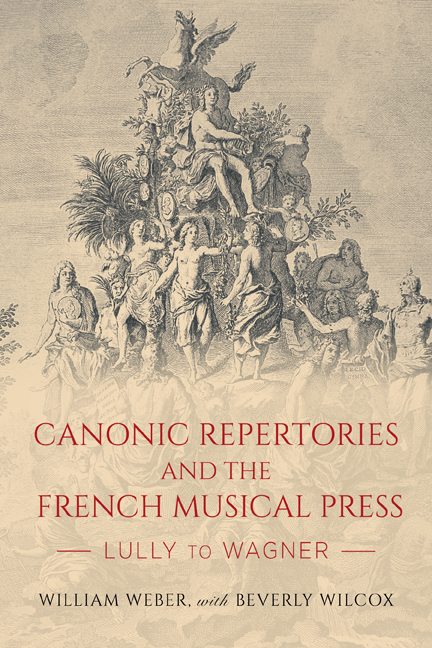Book contents
- Frontmatter
- Contents
- Acknowledgments
- List of Illustrations
- Introduction
- 1 The Domestic versus the Foreign in Eighteenth-Century Paris and London
- 2 Elements of Canon Formation at the Concert Spirituel (Beverly Wilcox)
- 3 To Praise or to Criticize? The Evolution of Music Criticism in Eighteenth-Century France
- 4 Haydn in the Press during the 1780s: How Did a Canon Arise?
- 5 Parallel Canons at the Opéra and the Comédie-Française at the End of the Ancien Régime
- 6 Negotiating Canonic Repertory and les progrès de la musique at the Paris Opéra, 1815–1830
- 7 The Evolution of le vieux répertoire at the Opéra-Comique in the Nineteenth Century
- 8 Richard Wagner, Concert Life, and Musical Canon in Paris, 1860–1914
- An Afterword
- Bibliography
- Index
An Afterword
Published online by Cambridge University Press: 26 May 2022
- Frontmatter
- Contents
- Acknowledgments
- List of Illustrations
- Introduction
- 1 The Domestic versus the Foreign in Eighteenth-Century Paris and London
- 2 Elements of Canon Formation at the Concert Spirituel (Beverly Wilcox)
- 3 To Praise or to Criticize? The Evolution of Music Criticism in Eighteenth-Century France
- 4 Haydn in the Press during the 1780s: How Did a Canon Arise?
- 5 Parallel Canons at the Opéra and the Comédie-Française at the End of the Ancien Régime
- 6 Negotiating Canonic Repertory and les progrès de la musique at the Paris Opéra, 1815–1830
- 7 The Evolution of le vieux répertoire at the Opéra-Comique in the Nineteenth Century
- 8 Richard Wagner, Concert Life, and Musical Canon in Paris, 1860–1914
- An Afterword
- Bibliography
- Index
Summary
This book has presented a set of studies showing how in France the concept of canon can inform us about the way in which certain composers achieved a significant form of cultural respect during the eighteenth and nineteenth centuries. Since the notion of musical “classics” has become identified with a particular epoch of music-making, it is helpful instead to see how canonic musical repertories signaled forms of respect and high respect for particular composers. It is also helpful to distinguish between the respect given before a composer's death and thereafter. As we have noted, Haydn held an incipient form of respect during the 1780s but less respect for quite some time after his death in 1809. Indeed, during the eighteenth and nineteenth centuries such respect lasted only two or three generations before being replaced by a repertory which might eventually become another canonic framework. Different canonic repertories developed in the separate worlds of opera and concerts and were influenced by contrasting social and musical configurations in the two worlds. As is shown by Beverly Wilcox's contribution in chapter 2, canons for opera and concerts each tended to last between fifty and seventy years, and then were replaced by new frameworks of taste and repertory.
When all is said and done, it was in France that canonic repertories played central roles for the longest period of time, arising variously in the worlds of opera and concerts. Frameworks of canonic repertory succeeded one another, featuring music successively by Lully and Rameau; Gluck, Piccinni, and Sacchini; and, finally, Rossini, Auber, and Meyerbeer. In no other country did as influential a set of movements in institutions and publics arise during that long period of time. In the eighteenth century the Opéra, the Comédie-Française, and the Concert Spirituel, though lacking any common management, evolved in relationship with one another as central institutions in French cultural life. The canonic repertory of Lully's operas evolved in parallel to the theatrical repertory of the Comédie-Française and, on a broader plane, the intellectual elite in the Académie Française. By the same token, the Opéra-Comique sponsored a canonic repertory parallel to the one at the Opéra which kept performing several works by Monsigny and Grétry for 120 years.
- Type
- Chapter
- Information
- Canonic Repertories and the French Musical PressLully to Wagner, pp. 267 - 270Publisher: Boydell & BrewerPrint publication year: 2021



